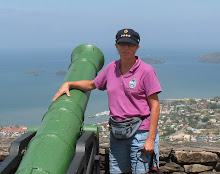St. George's is a very beautiful town, built on the hills surrounding a large and excellent harbour. Colourful houses stand in disorganized ranks on the hillsides, with all the gaps filled in by green. The harbour itself divides into two bays. The northern one, The Carenage, is in the centre of town. Wharf Road, lined with shops and restaurants, runs around the perimeter of the bay. The other bay lies to the southeast and is called The Lagoon. It is here that cruisers anchor, and a number of yacht clubs and marinas have sprung up to meet their varied needs. One particularly swank place is the brainchild of a Quebecer...or so said someone we chatted with.
We made our way into The Lagoon in mid-afternoon, set our anchor, tidied, and had a post-crossing RP. Looking at the boats around us, there were distinct differences from those we had seen last up at the Bitter End. There, there had been a quantity of US and Canadian flags, as well as a number of rentals. Here, we were in a small navy of French, British, German, Dutch, and Italian boats. The way to the Caribbean from the Med is southwest to Barbados and Grenada, then catch the trades up through the islands in the fall. North American cruisers thin out the farther you get from the Bahamas.
We launched Boffo and headed off to explore a bit. We went in to one dock to look at another Flica. There were not many made, so it was fun to meet one of Django's sisters. We puttered past huge old working ships. Real tramps and wonderful to behold. We had read there is a dinghy dock in The Carenage, but a circuit failed to reveal it. Eventually, we moored at the police dock. We were told that wouldn't be a problem. Then we walked along Wharf Road to a restaurant recommended in our guide: Nutmeg.
I could rhapsodize on callaloo soup generally, but will refrain. Instead I will rhapsodize on Nutmeg's callaloo soup. Absolutely fabulous. We enjoyed our meal very much.
The next day, we headed over to the yacht club where we settled the burning issue of the proper pronunciation of the island's name: Grenayda, *never* Grenahda. "That's in Spain," said our interlocutor disdainfully.
We lunched at a cafeteria-style joint called The Creole Shack. Good stuff. Then went for a wander. I spotted a tiny book store. I have tried to pick up a small local cookbook at each of the islands we have visited. Search as I would, though, there seemed to be nothing. Until we turned to leave. The serene elderly woman sitting at the glass fronted counter was reading the Bible. Below the Bible were a number of cookbooks. We chatted. Rita (for that was her name) was a wonderful woman. She told me which cookbook to buy. We got to talking. She told us her husband, who had been in insurance (WW knew something of the people he had worked with) had died in March. She soldiered on. She showed us his picture. She told us all about him.
The people of Grenada are, generally, deeply religious and profoundly conservative. Youth will gather by the waterside to sing (fantastically well) all the latest...Gospel songs. Short shorts, tank tops, and skimpy skirts are frowned upon. But for friendly, outgoing, helpful, kind people, you need look no farther.
We climbed up to Fort George, which overlooks the approach to the harbour, including the cruise ship dock. The fort now houses the police academy. It didn't feel like a tourist destination as it is in poor repair. However, the view is spectacular. And Grenada must be forgiven for much. Although technically outside "the box" (insurance-speak for where hurricanes blow), the island was devastated by Ivan in 2004, its first hurricane in more than 100 years. Crops were destroyed, buildings razed, and the rain forest was levelled. The island has made an incredible comeback.
We had read that there is a terrific outdoor market in St. George's and were trying to figure out how to get to it. A nice fellow in worn blue overalls walked us over the fort, introduced himself as a policeman (WW had his doubts...thought he might be a convict), and pointed out various sights. He it was who told us about the Quebec involvement in the new ritzy yacht club. When we said we wanted to find the market, he marched us to the west side of the fort and up a little turret. From there he pointed out the market and the way to get there. WW tried to offer him some money for his help, but he declined, saying it had been his pleasure. "Go to the market," he said. "It is a very good market. It has everything you want, except what you don't want." Then he grinned cheerfully at his extraordinary wit.
The market was an extensive affair of little booths selling myriad spices in an amazing variety of packaging. Everything from plastic bags to woven baskets full of scented wonders. Grenada is the spice island of the Caribbean, producing vast quantities of cinnamon, cloves, ginger, turmeric and, top of the list, nutmeg. One fellow, lounging in a chaise longue, asked WW something. It took a minute for the singsong to make sense. "Home grown?" "No, thanks."
All around the periphery of the market are the fruit and vegetable stalls. We met a number of fruits we had never seen before. The vendors were happy to let us sample their wares. Very canny. We went away loaded down with exotic fruits.
Walking up the hill from the market, we were addressed by a striking woman in business attire. She wanted to sell us property. Given WW's real-estate predilictions, we chatted for quite a while.
That evening, we dined at the yacht club where I had my first flying fish. I'm afraid it was a disappointment. WW opined that it might have been frozen.

















